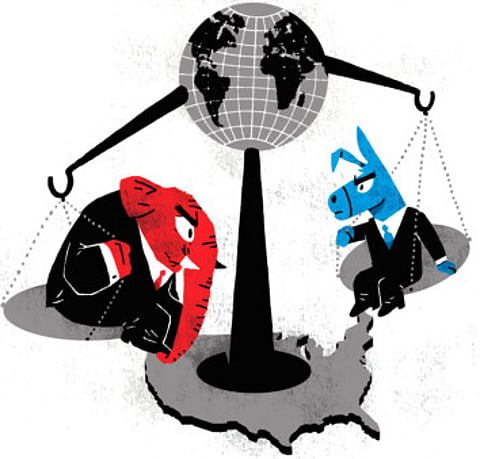America’s new isolationism?
Between the Bush-era arrogance and current disengagement lies a middle ground

Is America becoming an isolationist nation? The question might seem strange in an era when the US military bestrides the world like no power since ancient Rome. It may seem oddly timed with American troops headed (in small numbers, for now) back to Iraq. It may seem ridiculous with them still fighting in Afghanistan and comfortably situated on bases stretching from Britain through the Horn of Africa to South Korea and Japan. It may seem ill-informed as American diplomats continue to discuss a nuclear deal with Iran, trade accords with China and the finer points of internet privacy protections with the European Union.
Yet, scratch the surface and another narrative emerges. This is the tale of a deeply polarised country where the left and the right, in heading toward their respective extremes, sometimes come full circle and meet one another. Among Republicans and Democrats alike there are strong constituencies advocating a more inward-looking foreign policy, though there is less agreement on why or how the US should retreat from the global stage.
America’s right wants to focus the military’s resources on counter-terrorism and sealing the country’s borders (from their perspective these are mostly the same thing). The left wants to cut the military’s budget and spend the resulting savings on social programmes at home. It hates Bush/Obama counter-terrorism almost as much as the right loves it, preferring cooperative international actions in which the US neither takes the lead nor foots most of the bill.
The strength of this new isolationism is easy to see in both of America’s political parties.
By most measures, Senator Rand Paul ought to be an asterisk among the Republican politicians, jockeying for their party’s presidential nomination in 2016. His positions on many core issues conflict with his party’s base. What makes Paul a top-tier candidate is the enthusiasm he generates with isolationist rhetoric that would not have been out of place in the 1930s. America, he says over and over, has to tend to its many problems at home and let the rest of the world take care of itself.
At the other end of the political spectrum, one of the few obstacles separating Hillary Clinton from the 2016 Democratic presidential nomination is a sense on the left that she is too ready — perhaps even eager — to use American power abroad. While promoting her book Clinton has tried to address this by apologising profusely for her senate vote in favour of the Iraq War, though her eagerness to let readers know that as Secretary of State she wanted to intervene more forcefully in Syria arguably undercuts her message.
In the middle of this debate stands Barack Obama. Like most second-term Presidents he is already thinking about his legacy. Part of this involves trying to articulate a foreign policy for the 21st Century — a task in which he has pleased few and annoyed many. Obama outlined his approach to foreign affairs in a speech in late May. The question, he said, is “not whether America will lead, but how we will lead ... To say that we have an interest in pursuing peace and freedom beyond our borders is not to say that every conflict has a military solution”. The US, he said, will act unilaterally when it feels it must, but should prefer collective action — military or diplomatic — whenever possible.
Conservatives see this as something bordering on cowardice. Republican critics, suddenly nostalgic for George W. Bush, complain that America is no longer willing to assert itself on the world stage. Former Vice-President Dick Cheney spoke for many on the right when he told Fox News recently that Obama is “a very weak president. Certainly the weakest I have seen in my lifetime”. To the left, the rhetoric that so angered Cheney makes Obama look like a man who is both too quick to call on the troops when something goes awry and unwilling to put his country’s awesome power at the service of anything higher than self-interest.
“Restraint means triage,” Michael Ignatieff, a respected scholar of human rights, longtime Harvard professor and former Canadian politician, recently wrote in the New York Review of Books. “It means rationing the use of American military force to protect vital national interests (and) staying out of other people’s wars or humanitarian disasters, no matter how strongly these may stir the conscience.”
A more sympathetic observer may note that the absolutist position taken by America’s isolationists is profoundly unrealistic. Superpowers have responsibilities, whether they like it or not. Equally unrealistic is the idea that America has the resources to intervene whenever and wherever it wants.
Washington could not solve all the world’s problems even if it wanted to do so and was suited to the task. Somewhere between the arrogance of the Bush era and the disengagement America’s left and right now seek lies a middle ground that is militarily, diplomatically and, most important, politically realistic. Obama deserves some credit for at least trying to find it.
Gordon Robison, a longtime Middle East journalist and US political analyst, teaches political science at the University of Vermont.


